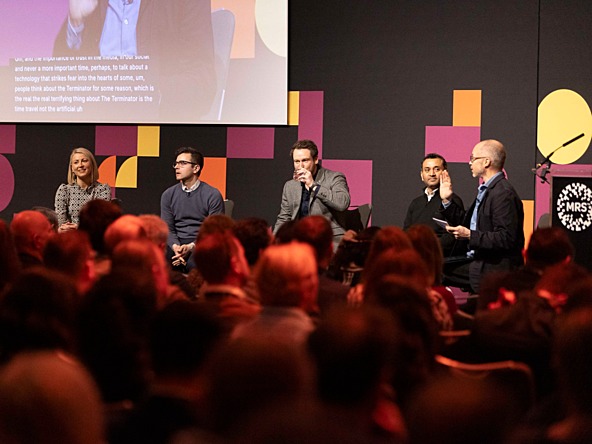Work needed to address concerns about AI, panel hears

Speaking on the panel, Kelly Beaver, chief executive officer at Ipsos UK and Ireland, said that there is a disconnect between how different people react to generative AI, with younger people and the general public more anxious than excited about its potential impact.
“It is likely that your younger colleagues might be playing about with it [generative AI] a bit more, but they might also be increasingly anxious and worried about what it means for their own jobs and the tasks they are doing, which may be some of the tasks that generative AI can help with.
“There’s a real job for us to take workforce and the general public with us on this transformation. That’s not straightforward.”
Beaver said that AI could help people do more impactful work, but warned that some people could end up losing parts of their job that they find satisfying.
“There’s huge opportunity for our industry to be more AI-enabled across all aspects of the research life cycle,” Beaver added. “That’s brilliant and scary at the same time. The teams enjoy some of the tasks – those are some of the areas where AI could be most impactful and take the hard yards away, but they are enjoyable hard yards.
“All research roles can be augmented and enhanced in some way by AI but in different ways. It is every researcher’s job to figure out what that is and make sure they are AI-enabled for the future.”
Also appearing on the panel, Chris Lindsley, global insight and analytics director – insights centre of excellence at Reckitt, said that he felt that people could be freed-up by AI for more creative work.
“There’s a lot of boring jobs that people don’t want to do,” he explained. “A lot of that is frequent, repetitive but consistent datasets. One of the big pushes is how we can drive productivity in that area.”
But he warned there was still some way to go before AI reached its full potential: “There’s a lot of exciting potential. I wouldn’t say it is reality right now. I think the future is not yet here. There’s a lot of potential, but it is not fully attainable right now.”
Lindsley added: “Storytelling is something it [generative AI] is not quite ready for yet, as far as I am concerned.”
Synthetic respondents and data also posed a risk if not implemented well, Lindsley added. “It is an obvious advantage people want to go after. Synthetic testing I am not on board with – it can quickly generate an echo chamber.”
Jatin Aythora, director of research and development at the BBC, told the panel that around 80% of the current hype around AI is “just noise” but that the technology was fast developing.
“A lot has changed: access to computation power, access to information and the ability to change information into meaningful things has changed the landscape,” Aythora added.
“Generative AI has become a utility. The question is how that will change the different industries we work in. The focus needs to be on the unique value generative AI can deliver. It is an opportunity to rethink the way business is run. Generative AI is an infrastructure.”
However, data transparency is crucial, he warned. “Every organisation who runs an LLM [large language model] should be publishing the data sources the LLM is trained on.”
Josh Muncke, director of retail, consumer and services at Faculty, said generative AI could shorten and tighten the decision feedback loops between data and action, and also help people interact with data.
But he said that AI was not yet working in more creative areas of the industry. “It is easier to take an existing process which has lots of data around it and do it faster and better, and easier to put in a business case the value of doing that more efficient, than it is to do something genuinely new or novel.”

We hope you enjoyed this article.
Research Live is published by MRS.
The Market Research Society (MRS) exists to promote and protect the research sector, showcasing how research delivers impact for businesses and government.
Members of MRS enjoy many benefits including tailoured policy guidance, discounts on training and conferences, and access to member-only content.
For example, there's an archive of winning case studies from over a decade of MRS Awards.
Find out more about the benefits of joining MRS here.














0 Comments